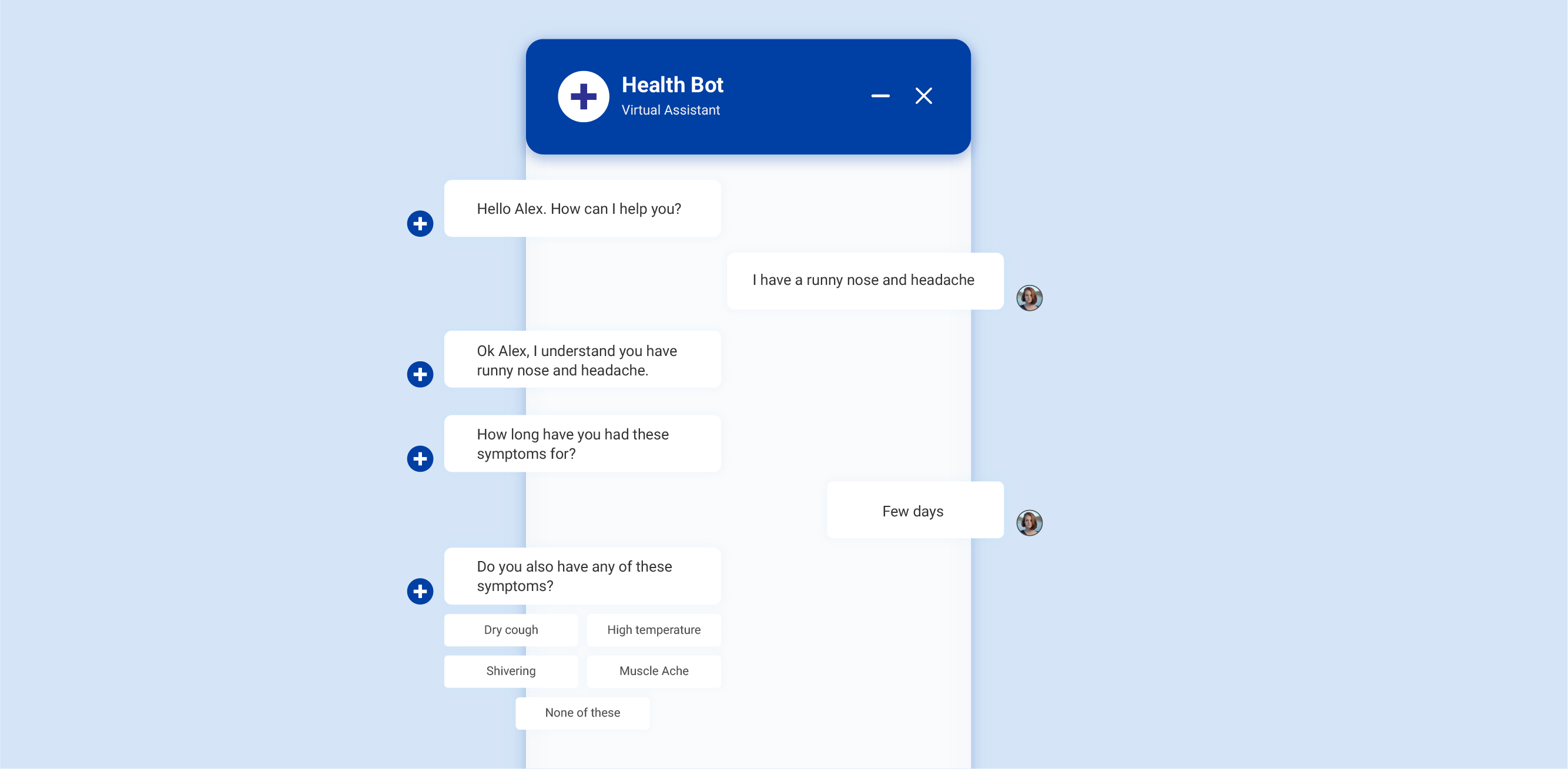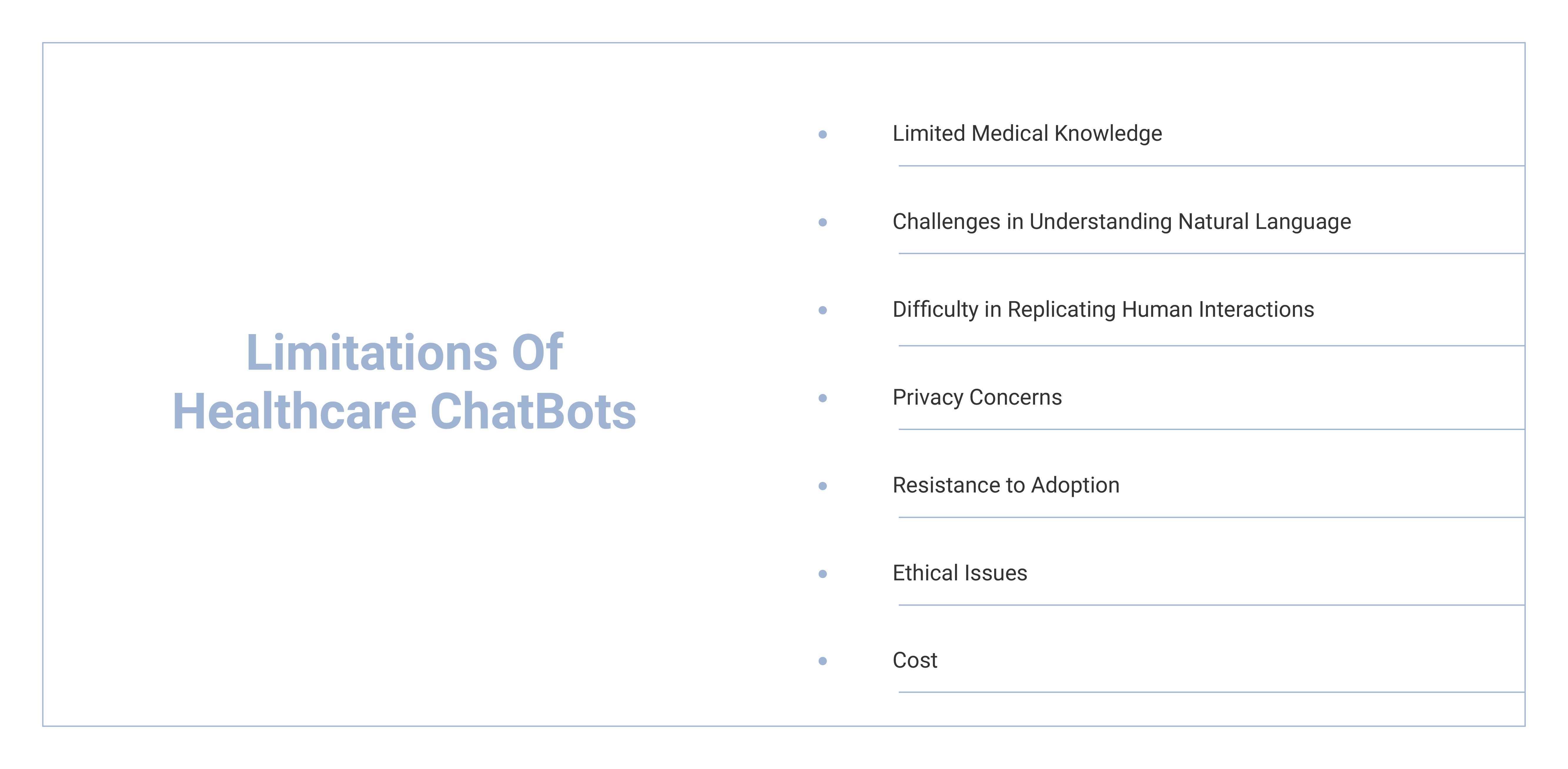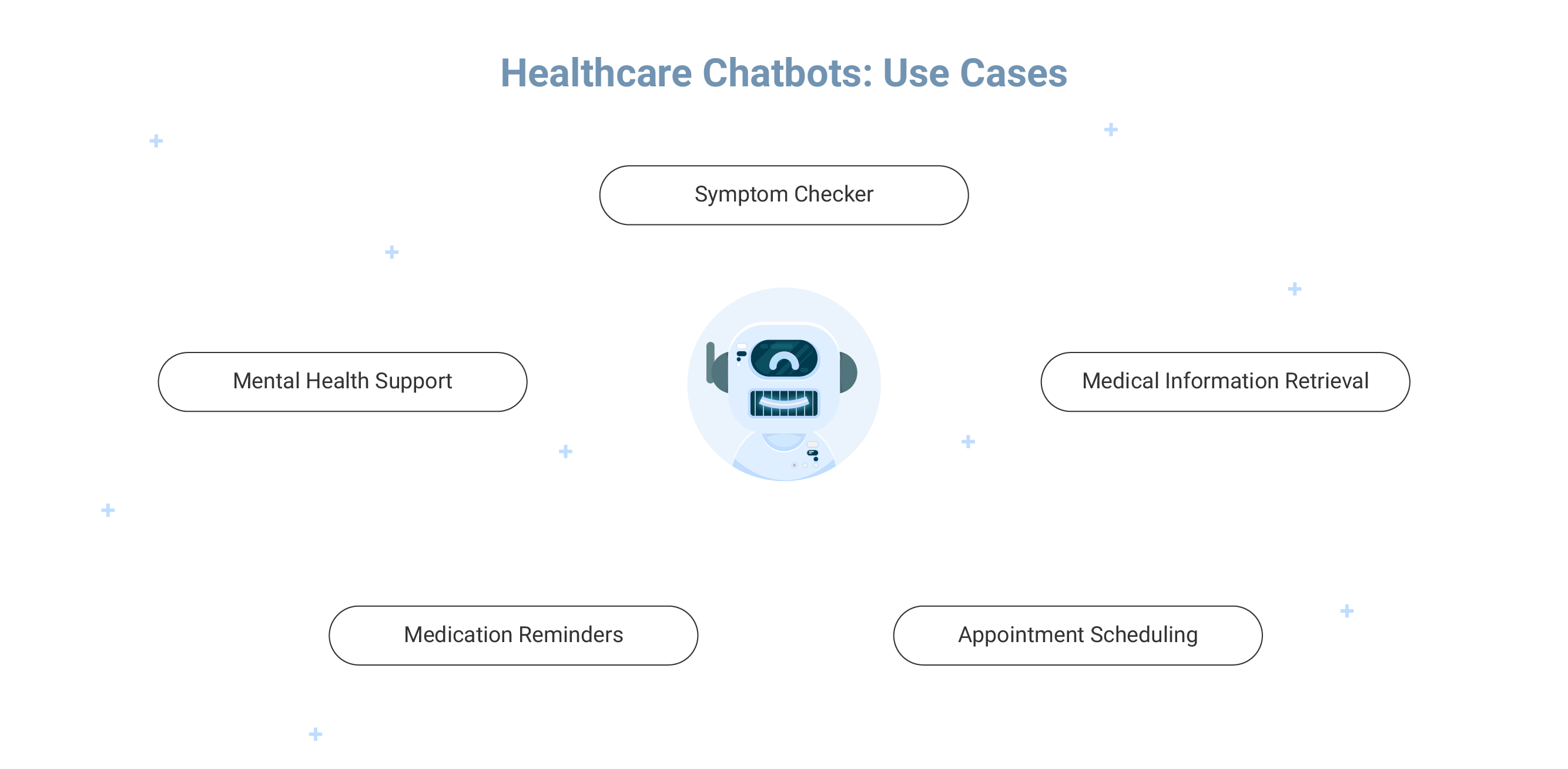Introduction
Navigating the healthcare sector can often be a complex and sometimes even a painful process for patients.
From booking appointments to getting test results to simply asking health-related questions, it can quickly get overwhelming. But what if there's a more straightforward solution?
A solution that's available 24/7 to help answer queries and streamline various elements of patient care?
Enter chatbots specifically tailored for healthcare.
In this how-to guide, we'll dive into how integrating chatbots into the healthcare system can not only enhance patient experience but also make administrative tasks a breeze.
We'll guide you step by step through the process of chatbot integration and how to leverage their capabilities to the fullest.
Let's step into the future of healthcare together, shall we?
Benefits of Chatbots in Healthcare
Chatbots offer significant benefits in improving patient experiences, streamlining administrative processes, assisting diagnosis and triage, and facilitating patient education and engagement.
Integrating chatbots into healthcare can lead to more efficient and patient-centered healthcare delivery.

24/7 Support And Personalized Interactions
Chatbots in healthcare can greatly enhance patient experiences by providing 24/7 support and personalized interactions.
Patients often have questions or concerns that arise outside of regular office hours.
With chatbots, they can access healthcare information and support at any time, reducing anxiety and improving overall satisfaction.
Whether answering general health inquiries or providing guidance on medication usage, chatbots can provide immediate responses and alleviate patient concerns.
Efficient Appointment Scheduling And Reminders
Efficient appointment scheduling and reminders are another area where chatbots excel in healthcare.
Patients can simply interact with a chatbot to schedule appointments instead of relying on manual phone calls or online portals.
Chatbots can access the real-time availability of healthcare professionals and book appointments accordingly, streamlining the process and reducing the administrative burden.
Additionally, healthcare chatbots can send automated reminders about upcoming appointments, reducing the likelihood of missed or forgotten appointments.
Assistance In Diagnosing And Triaging Patients
Chatbots can also assist in diagnosing and triaging patients.
By collecting patient data and symptoms through interactive conversations, chatbots in healthcare can provide preliminary assessments and direct patients to appropriate resources or healthcare professionals.
This helps prioritize urgent cases, optimize appointment scheduling, and ensure patients receive timely and appropriate care.
AI chatbots for healthcare can also help patients access relevant educational materials and resources, empowering them to make informed healthcare decisions.
Enhancing Patient Education And Engagement
In addition to improving patient experiences, chatbots into healthcare enhance patient education and engagement.
Through personalized interactions, chatbots can provide educational content tailored to each patient's specific health needs and interests.
This can include information on managing chronic conditions, preventive healthcare measures, medication instructions, and lifestyle recommendations.
Chatbots can also collect patient feedback and input, allowing healthcare providers to gather valuable insights and improve the quality of care.
There are some challenges in integrating chatbots into healthcare; let us see what they are.
In this section, we'll delve into the various benefits that chatbots can bring to the healthcare industry. From streamlining routine tasks to enhancing patient engagement, chatbots are revolutionizing the way healthcare providers offer their services.
Personalized Patient Experiences
Chatbots can provide personalized healthcare guidance based on patients' medical history and preferences, significantly enriching the patient's experience and engagement.
Improved Data Accessibility<
Chatbots can access and share patient data seamlessly under proper protocol, providing valuable support in functions like medical record retrieval and treatment tracking.
Increased Patient Engagement
Through interactive features like health monitoring alerts and personalized health tips, chatbots can foster higher patient engagement.
Cost-effective Solution
Chatbots present a cost-effective solution for the healthcare industry, handling multiple tasks requiring a considerable amount of human resources, thereby saving significant operational costs.
Suggested Reading-
Challenges In Integrating Chatbots Into Healthcare
To successfully integrate chatbots into healthcare, addressing and overcoming these challenges is important.
By prioritizing data privacy and security, ensuring accuracy and reliability, and actively addressing resistance from healthcare professionals and patients, healthcare organizations can harness the full potential of chatbots in providing improved patient care and experiences.

Ensuring Privacy And Security Of Patient Data
Integrating chatbots in healthcare comes with challenges. One of the most critical challenges is ensuring the privacy and security of patient data.
To protect patient information, healthcare organizations must comply with strict regulations, such as the Health Insurance Portability and Accountability Act (HIPAA).
Chatbots in healthcare must be designed and implemented with robust security measures to safeguard sensitive data. This includes encryption, access controls, and secure data storage practices.
Maintaining Proper Accuracy And Reliability In Chatbot Responses
Another challenge lies in maintaining the accuracy and reliability of chatbot responses.
Chatbots into healthcare rely on machine learning algorithms to understand and respond to user inputs.
However, they are not infallible, and errors can occur. It's essential to continuously update and train chatbots with accurate and up-to-date information to minimize inaccuracies.
Regular monitoring and quality assurance processes should be in place to identify and rectify any incorrect responses.
Overcoming Resistance From Healthcare Professionals And Patients
Resistance from healthcare professionals and patients can also be a challenge in integrating chatbots.
Some professionals may need more clarification about the capabilities and reliability of chatbots, which can hinder their adoption.
It's crucial to address their concerns and provide proper training to healthcare professionals on how to utilize chatbots in their workflows effectively.
Similarly, patients may initially hesitate to trust chatbots with their healthcare concerns.
Educating patients on the benefits and capabilities of chatbots and providing transparent information about how their privacy and data security are ensured can help overcome this resistance.
Now, we will see the steps to integrating Chabot into healthcare.
Step-by-Step Guide for Integrating Chatbots
Integrating chatbots into healthcare requires a step-by-step approach to ensure successful implementation.
Here is a guide for integrating chatbots in healthcare:

Defining Objectives and Identifying Use Cases
Begin by clearly defining your objectives for integrating chatbots into healthcare.
Identify specific use cases where chatbots can add value, such as providing 24/7 support, appointment scheduling, symptom triage, or patient education.
Understanding your goals and use cases will help you focus on your chatbot's necessary features and functionalities.
Selecting And Customizing The Chatbot Platform
Research and evaluate different chatbot platforms to find one that aligns with your healthcare organization's requirements.
Consider scalability, security, integration capabilities, and natural language processing capabilities. Choose a platform that allows customization to match your brand identity and meet specific healthcare needs.
Integrating with Existing Systems and Workflows
Ensure the chatbot seamlessly integrates with your existing healthcare systems and workflows.
This may involve integrating with electronic health record (EHR) systems, appointment scheduling systems, or patient databases.
Collaborate with IT teams to ensure smooth integration and data exchange between the chatbot and other healthcare systems.
Testing and Training the Chatbot
Before deployment, thoroughly test the chatbot to ensure accuracy and effectiveness.
Use real-world scenarios and user interactions to validate the chatbot's responses and functionalities.
Train the chatbot using relevant healthcare data and provide a comprehensive knowledge base.
Continuously fine-tune and optimize the chatbot's algorithms to improve its performance.
Monitoring and Continuous Improvement
Implement monitoring systems to track the chatbot's performance and collect data on user interactions.
Analyze metrics such as response time, user satisfaction, and task completion to identify improvement areas.
Actively gather feedback from users and healthcare professionals to identify issues or gaps in the chatbot's functionality.
Regularly update and enhance the chatbot's capabilities to meet evolving user needs and address limitations or shortcomings.
Let us see some examples of Integrating Chatbots into the Healthcare System.
Successful Case Studies of Integrating Chatbots into Healthcare System.
Several successful case studies of healthcare organizations have implemented chatbots to improve their patient care experience.
One example is the Boston Children's Hospital. The hospital designed a chatbot called "Children's MD" that answers parents' questions about their child's symptoms and health issues.
The chatbot uses natural language processing algorithms and a vast database of medical knowledge to provide personalized responses.
The hospital reported that the chatbot helps relieve the burden on call centers and provides parents with quick and accurate information, resulting in increased satisfaction and reduced anxiety.
Another example is the American Cancer Society, which created a chatbot named "Lily". The chatbot guides cancer patients and their families through their cancer journey by providing information on treatments, coping strategies, and emotional support.
The chatbot also assists users in finding resources and connecting them with other patients. The American Cancer Society reported that user satisfaction rates for Lily were high, and the chatbot successfully increased engagement with their patients.
A chatbot named "Woebot," designed by a team of psychologists, helps in monitoring mood and provides cognitive behavioral therapy.
It is available online, and the chatbot uses AI to train individuals to learn cognitive-behavioral therapy techniques.
Woebot was effective in providing mental health support, as it acted as a personal coach and provided feedback tirelessly anytime.
It is affordable, accessible, and is an excellent tool for people seeking support during tough times.
Through these cases, it is evident that chatbots can successfully integrate into healthcare systems and provide immense value to healthcare organizations and patients alike.
Conclusion
Chatbots present immense potential for revolutionizing healthcare delivery.
Providing 24/7 patient support, automating administrative tasks, and facilitating care enable more efficient and personalized medicine.
If you're ready to unlock the benefits of AI-powered health assistants, choose BotPenguin.
Our conversational AI-powered chatbot platform makes it easy to build customized chatbots that integrate securely with your health IT ecosystem.
Deploy virtual assistants to guide patients, answer questions, schedule appointments, and more.
Sign up with BotPenguin to enter the future of seamless, engaging patient experiences—where human care meets conversational AI.
Frequently Asked Questions(FAQs)
How can chatbots enhance the patient experience in healthcare?
Chatbots can enhance the patient experience in healthcare by providing round-the-clock support, answering frequently asked questions, offering personalized health information, and guiding patients through their healthcare journey.
With chatbots, patients can easily access information, schedule appointments, and receive real-time assistance, leading to improved satisfaction and convenience.
What are the key considerations when selecting a chatbot platform for healthcare integration?
When selecting a chatbot platform for healthcare integration, it is important to consider factors such as scalability, security, integration capabilities, natural language processing capabilities, and customization options.
Assessing the platform's ability to integrate with existing healthcare systems, like electronic health records, is crucial for seamless data exchange and workflow integration.
How are chatbots trained to provide accurate and reliable information in healthcare?
Chatbots in healthcare are trained using comprehensive knowledge bases that include medical information, treatment guidelines, and patient data.
Natural language processing algorithms are utilized to interpret user queries and provide appropriate responses based on the training data.
Regular testing and fine-tuning of the chatbot's algorithms ensure accuracy and reliability in delivering healthcare information.
What are the potential benefits of integrating chatbots into healthcare systems?
Integrating chatbots into healthcare systems can yield several benefits, including improved patient engagement and satisfaction, reduced call center burden, increased efficiency in providing healthcare information, enhanced appointment scheduling and reminders, and cost savings.
Chatbots can streamline healthcare processes and provide timely support to patients, leading to better overall healthcare experiences.
How can chatbots be integrated with existing healthcare systems and workflows?
Chatbots can be integrated with existing healthcare systems and workflows by collaborating with IT teams to develop seamless data exchange mechanisms.
By leveraging APIs and integrating with electronic health records, appointment scheduling systems, or other relevant databases, chatbots can access and provide accurate information from existing healthcare systems.
Will chatbots replace healthcare professionals in the future?
Chatbots are not intended to replace healthcare professionals but rather augment their work. Chatbots can handle routine inquiries and provide basic support, freeing up healthcare professionals' time to focus on more complex tasks and patient needs.
Human expertise and judgment are critical in healthcare, and chatbots are designed to work alongside healthcare professionals to improve efficiency and enhance patient care.


